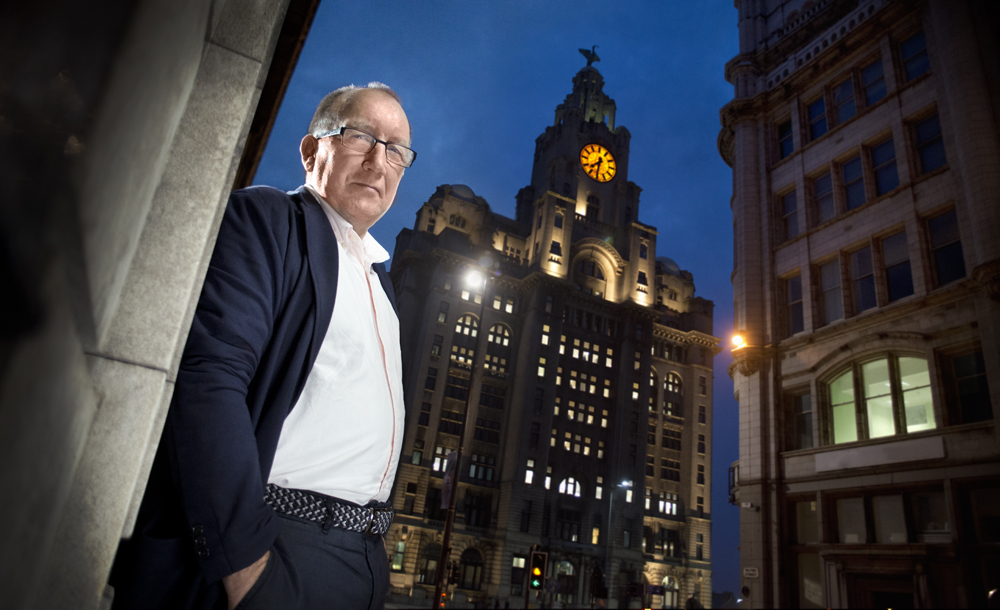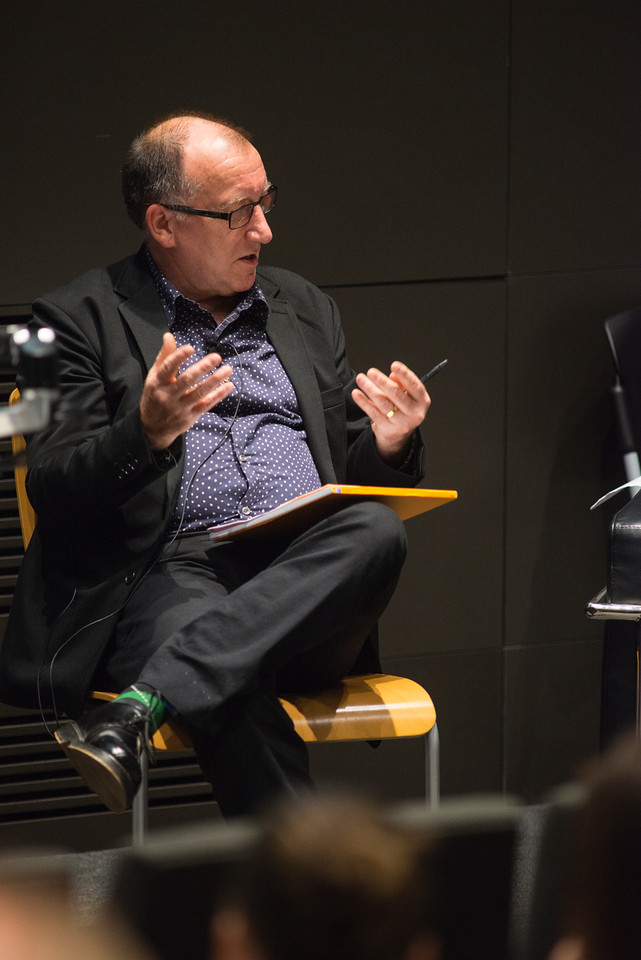
A recent invitation to talk about 35 years of Film: In and From Birmingham, 1980 – 2015, gave me the opportunity to reflect publicly on the direction that my career in film had taken.
The talk was at MAC Cinema in Birmingham. I decided to talk not only about the number and variety of films that I have been associated with – as a developer of talent, as a producer and exec producer, and as a Film Fund Head – but also on the changing parameters of film policy at regional and national levels. There have been various mutations from Regional Arts Boards, to British Film Institutes to UK Film Councils to Regional Screen Agencies inter alia over the decades, as new, incoming government regimes have brought with them their own cultural vistas and sculpted immediate and at times ‘tribal’ changes.
MAC Cinema is the leading publicly funded art house and indie cinema in Birmingham and they came up with the 35 years in Film invitation, mindful also of an association of some longevity that I have had with the venue. I was a Board Member for 6 years of the parent organisation, Midlands Arts Centre – one of the best attended arts venues in the country, still going strong since its formation in 1962, and substantially developed under the aegis of Labour Arts Minister Jennie Lee MP – as well being the founding director of the Birmingham International Film/Television Festival which was incubated in MAC’s offices in the mid 1980’s, and operated successfully in the city until 2002. In fact, the Festival opened MAC’s new cinema in 1987 with a regional premiere of Business As Usual, starring Cathy Tyson and Glenda Jackson, in an early production by one of Edge Hill’s Honorary Doctorates, Colin McKeown.
The talk itself was by way of an in conversation with Sandra Hebron, who also has an Honorary Doctorate from Edge Hill, and who until a few years back was Artistic Director of the BFI London Film Festival, where she helped to foster a new generation of culturally engaged UK cinema. Sandra is now Head of Screen Arts at the National Film and Television School, and an international film festival consultant.
The clips that were screened (see full list below) charted the various phases in my film work, whilst also documenting how the regional and national policy landscape had altered; a sort of historical tour d’horizon.
From my work as Founder in 1980 of Birmingham Film/Video Worksop/BFVW, aspects of which are part of my research interests at Edge Hill, Mirror, Mirror and Giro: Is This The Modern World?, were screened – the first shot on 16mm film, the second on video. This selection represented two of the hallmarks of BFVW’s output – an engagement with stories from multi-cultural Birmingham by emerging film makers; and pioneering participatory work with young people adopting and applying an aesthetic of ‘disruptive television.’

Butterfly Kiss, Under The Skin and Beautiful People are three films that characterise the influence that Liverpool’s Moving Image Development Agency/ MIDA had in the mid 1990’s. As MIDA’s Director I helped establish the first regional feature film fund in England, backed by Objective One, European Regional Development Funds…..as I used to sing, ‘Objective One for the Money, Two for the Show, Three to Get Ready, Now Go Make the Film….’
MIDA’s film fund worked with Liverpool writers, such as Frank Cottrell Boyce, Jimmy McGovern, and helped get their first feature film screenplays into production, (respectively, Butterfly Kiss; Heart) whilst also attracting to the city numerous films, dramas and television series. Such an approach meant working closely with the Liverpool Film Office, with whom we devised an approach that delivered the city both ‘in front of the camera’ – that is, locations sourced by the Film Office – and ‘behind the camera’ – that is, employment for crew, technicians, and creatives engineered by MIDA’s investment.
Beautiful People won an award at the Cannes Film Festival – Un Certain Regard award – and was rapturously greeted by the international film critics in attendance, especially the opening sequence when the black humour of the director, Jasmin Dizdar, is slyly pointed at Churchill’s detrimental role in the history of the Balkans. The film was funded by an array of national and regional public funds – BFI, MIDA, Lottery etc – almost all of which were embroidered together by the 1997 incoming Blair government to fashion the UK Film Council, which in the late 1990’s assumed strategic precedence over the BFI regarding film policy and funding in the UK.
I Could Read The Sky, Lawless Heart and My Brother Tom represent films from this period of the transition from one public film body – the BFI – to another, the UK Film Council, modelled on the French CNC. We were able to get the films produced before complete regime change took place and new vistas of editorial taste and choice, driven by harsher commercial criteria, hove into view at the UK Film Council. All three films have scintillating performances – novelist Dermot Healey as the ageing Irishman in ‘County Kilburn’; Bill Nighy falling for someone he shouldn’t in Lawless Heart; and Ben Whishaw in his debut film revealing what a formidable actor he was going to develop into.
The closing two films in the clips reel point to my time as Head of Production at Scottish Screen, and my returning time to Birmingham to be involved again in city based film matters. Festival, from the pen and direction of Annie Griffin, is a wonderfully observed black comedy about comedy, particularly of the Edinburgh Fringe and stand up genre. Wickedly acidic.
Made in Birmingham ; Reggae Punk Bhangra, as a Birmingham based film mirroring the opening clip from Mirror Mirror, returned me to the making of music docs and borrowing footage from my earlier production for Channel 4 in 1992 of the music heritage of Birmingham, Motor City Music Years.
Clips screened from the below films:
Mirror, Mirror, dir Yugesh Walia; Birmingham Film Workshop, 1980; selected for Edinburgh International Film Festival, 1980.
Giro: Is This The Modern World? dir Jonnie Turpie and DHSS; Birmingham Film/Video Workshop, 1985; broadcast by Channel 4; Tv, Video, Documentary and Youth Festivals.
Butterfly Kiss, dir Michael Winterbottom, writer Frank Cottrell Boyce; with Amanda Plummer, Saskia Reeves, Ricky Tomlinson; MIDA with British Screen; 1995; Awards – nominated for Golden Bear, Berlin Film Festival; nominated for European Film Award.
Under The Skin, dir Carine Adler; with Samantha Morton, Rita Tushingham; MIDA with BFI, Channel 4; 1996; Awards won at Sundance, Seattle, Toronto, Edinburgh Film Festivals in 1997/98; nominated for a BIFA.
Beautiful People, dir Jasmin Dizdar; with Charlotte Coleman; MIDA with BFI, British Screen, National Lottery; 1999; Awards won at Cannes Film Festival, Karlovy Vary and St Petersburg; nominated for two BIFA’s.
I Could Read The Sky, dir Nicola Bruce; with Dermot Healey, Stephen Rea, Brendan Coyle; BFI with Irish Film Board, Channel 4; 2000; Awards, nominated for Tiger Award, Rotterdam.
My Brother Tom, dir Dom Rotheroe; with Ben Wishaw, Jenna Harrison, Honeysuckle Weeks ; UK Film Council with National Lottery; 2001; Awards won at Verona, Sochi, Angers, St Petersburg Film Festivals; BIFA award winner.
Festival, dir Annie Griffin; with Chris O’Dowd, Richard Ayoade, Stephen Mangan, Lucy Punch; Scottish Screen with Film 4; 2005; Awards won at Stockholm, Dinard Film Festivals; a BIFA, 2 Scottish BAFTA’s.
Made in Birmingham: Reggae Punk Bhangra, dir Debbie Aston; with UB40, Steel Pulse, Au Pairs, Nightingales, Duran Duran, Dexy’s Midnight Runners etc; UK Film Council and Screen West Midlands; 2010; Awards – 3 nominations for Royal Television Awards.
Written by Professor Roger Shannon, Director of ICE, Edge Hill University’s Institute for Creative Enterprise.
Roger Shannon is a Professor of Film and Television who specialises in UK film policy and Independent Film. His published work in this area has been presented papers at internal, national and international conferences.
He has been associated with over 20 UK feature films including Festival, Butterfly Kiss and Under The Skin and has worked with ground breaking talents including Jimmy McGovern, Michael Winterbottom and Frank Cottrell Boyce. Roger’s productions have won awards at International Film Festivals such as Cannes, Toronto, Sundance, Edinburgh and Berlin.
